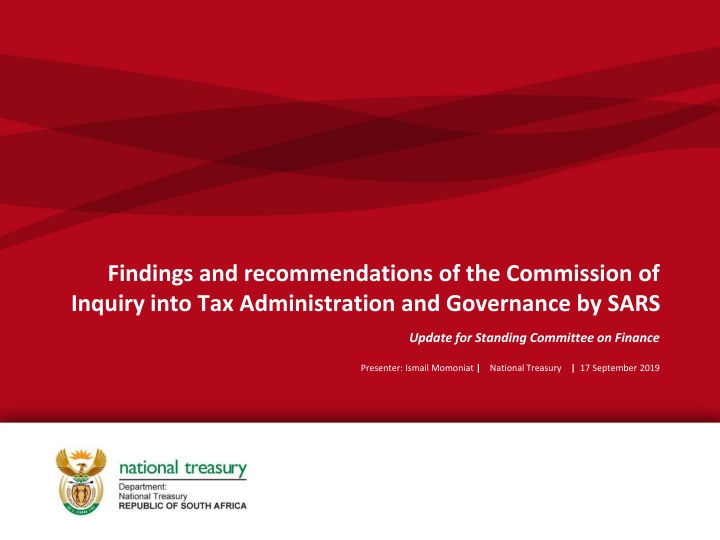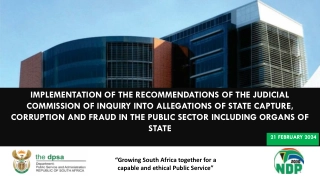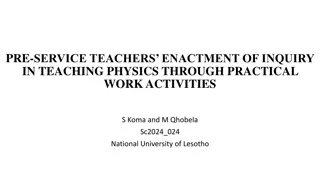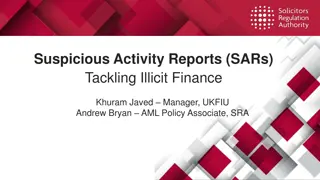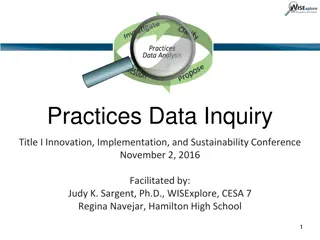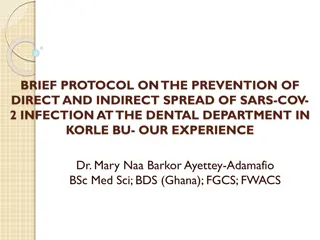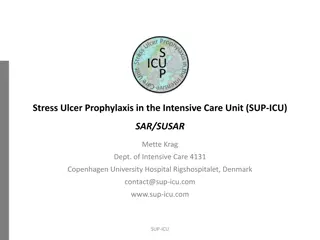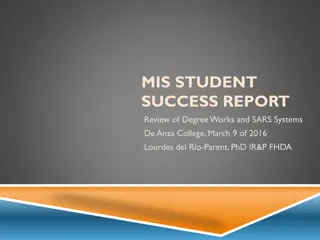Findings and Recommendations of SARS Governance Commission Inquiry Update
The Nugent Commission of Inquiry into SARS identified a failure of governance and integrity under the former Commissioner, leading to urgent recommendations for removal and transparent appointment of a new Commissioner. The final report revealed instances of maladministration, mismanagement, and a premeditated restructuring causing disruption and weakened enforcement at SARS.
Download Presentation

Please find below an Image/Link to download the presentation.
The content on the website is provided AS IS for your information and personal use only. It may not be sold, licensed, or shared on other websites without obtaining consent from the author.If you encounter any issues during the download, it is possible that the publisher has removed the file from their server.
You are allowed to download the files provided on this website for personal or commercial use, subject to the condition that they are used lawfully. All files are the property of their respective owners.
The content on the website is provided AS IS for your information and personal use only. It may not be sold, licensed, or shared on other websites without obtaining consent from the author.
E N D
Presentation Transcript
Findings and recommendations of the Commission of Inquiry into Tax Administration and Governance by SARS Update for Standing Committee on Finance Presenter: Ismail Momoniat | National Treasury | 17 September 2019
Nugent Commission of Inquiry into SARS The President established Commission of Inquiry into Tax Administration and Governance by SARS ( Nugent Commission ) on 24 May 2018 Commission submitted an interim report on 27 September 2018 and its final report on 11 December 2018. The main finding is that the failings listed in the terms of reference stem from a common cause, namely a massive failure of governance and integrity at SARS under the former Commissioner. Key and most urgent recommendation made in the interim and final reports is the removal of the former Commissioner and the steps for a transparent process for the appointment of a new Commissioner. This recommendation was accepted by the President implemented immediately Remaining recommendations serve as corrective actions, including substantive recommendations aimed at improving governance and developing robust mechanisms to prevent, detect, halt or preclude such a failure in future. 2 2
Background: Legislation that governs SARS SARS Act (No 34 of 1997) A high degree of autonomy to SARS, Commissioner responsible for internal organization including organizational structure, appointment of all staff and remuneration structure SARS reports to the Minister of Finance as Executive Authority, who also approves terms and conditions of employment of senior management (section 18(3)) Minister of Finance not allowed access to any taxpayer affairs, and cannot take over any of the functions of the Commissioner Tax Administration Act (No 28 of 2011) Governs tax administrative processes and institutes checks and balances Eg. limits on discretion, dispute resolution, tax offences and allowable penalties Concepts of taxpayer confidentiality and SARS confidential information developed Sets up Office of the Tax Ombud Tax legislation (listed in Schedule 1 of SARS Act) sets out policy Eg. Income tax act, VAT Act, Customs and Excise Act, Employment Tax Act Minister of Finance is custodian of tax policy and all money bills General legislation eg. PFMA, PAJA also apply to SARS 3 3
Summary of Commissions recommendations The final report contained 27 specific recommendations [bracketed references in this presentation refer to the numbering in the report] Final report confirmed instances of maladministration and mismanagement at SARS between 2014 and 2017 Each of these occurrences deserve exhaustive investigation, including criminal investigation, and the final report recommends these be followed up by the proper authorities The premeditated restructuring of SARS was intended to take control of SARS , and ultimately bound to cause disruption and bewilderment As a result, enforcement was weakened, as the units that investigated the illicit trades ceased to exist Revenue collection suffered, corroborated by falling tax payer compliance Also evidence of abuse of procurement processes - particularly large-scale consulting contracts to reform SARS operations and information technology systems The recommendations aim to correct past infractions and to prevent any future recurrence of SARS decline. 4 4
Structure of Commission report (available on Presidency s website) PART I - BACKGROUND Chapter 1 Introduction Chapter 2 The State of SARS Before and After Chapter 3 The Seizing of SARS Chapter 13 Bonuses Chapter 14 Taxpayer Affairs Chapter 15 Reports of the Auditor-General Chapter 16 Debt Collection Contracts Chapter 17 Media Statements Chapter 18 SARS and Other State Institutions Chapter 19 International Relations PART II - THE RESTRUCTURING OF SARS Chapter 4 The Fabric of the SARS Restructuring Chapter 5 Information Technology and the Gartner Contracts Chapter 6 The Resignation of Senior Employees. Chapter 7 The New EXCO Chapter 8 The Anti-Corruption Unit and Related Events 2 PART IV - REMEDIAL MEASURES Chapter 20 A Massive Failure of Governance and Integrity Never Again. PART V - RECOMMENDATIONS PART III - SPECIFIC ISSUES Chapter 9 Revenue Collection Chapter 10 VAT Refunds Chapter 11 Litigation Chapter 12 Settlements 5 5
Urgent recommendations on appointment of Commissioner were implemented by the President The interim report recommended the immediate removal of the former Commissioner. This recommendation was accepted and implemented by the President The final report recommended appointment of a new Commissioner via a more transparent process [16.3], namely appointment of persons to a selection panel who should be apolitical and not answerable to any constituency, and should be persons of high standing who are able to inspire confidence across the tax-paying spectrum . Criteria for appointment were also outlined in the Report In terms of section 6 of the SARS Act, 1997 (as amended), the President must appoint a person as the Commissioner for SARS when there is a vacancy. The President followed Nugent recommendations on appointment process to the letter and spirit, even though this went far beyond minimum requirements of the law Most transparent appointment process to appoint Commissioner since establishment of SARS in 1997 President delegated the Minister of Finance to initiate the process for the appointment of Commissioner for SARS and constitute a selection Panel. Full reports of the selection process were made public on announcement of the appointment, Experience from this process will inform the coming legislative amendments to SARS Act 6 6
Recommendations on Governance of SARS (Chapter 20) The Commission made several proposals related to governance or strengthening organisational leadership, requiring amendments to current legislation to be overseen by the Minister of Finance (Chapter 20) Key principle is the autonomy of SARS: It is a non-negotiable proposition that SARS autonomy is sacrosanct. This truism was identified as such by the Katz Commission in its First Interim Report (November 1994) ( par [11] on p175) Commission of fervent view that no provisions related to the governance of SARS should .have the impact of infringing on the autonomy of SARS. Governance of SARS can be enhanced by the granting of powers to the Minister. Par [39] on p186 notes the national budget and tax policy and management of the country s finance vests in the MoF. The participation by the Minister of Finance in certain aspects of the governance of SARS is a reality that not be viewed as a detraction from the autonomy of SARS . It recommends amending the .. SARS Act to give additional powers to the Minister (eg in approving the business plan of SARS) Commissions view is that Commissioner of SARS should be appointed by the President, after consulting with the Minister of Finance, according to a transparent process (par [40] on page 186) 8 8
Recommendations on Governance of SARS (continued) Strong view of Commission that governance SARS will be enhanced by the appointment of an Inspector General (pages 189-190) IG provides a mechanism to provide oversight over SARS functioning, in order to detect abuse in a manner that protects SARS primary mandate and taxpayer confidentiality The Commission also recommends legislative provisions for a mandatory advisory Executive Committee, including Deputy Commissioner(s) [16.5]. The functions of this committee is envisaged to be described in broad terms by legislation The Commission is not in favour of an oversight board (t)he Commission is not persuaded that an oversight board is indeed a useful instrument (pg 184 par 33) Commission differs with DTC, which previously recommended an oversight board The Commission affirmed that the current role of the Office of the Tax Ombud [16.2], whose mandate is confined broadly to addressing taxpayer rights which is its appropriate role and it should not be involved in the governance of SARS . Should not play the IG role. DTC has also recommended a taxpayer bill of rights 9 9
Summary of Commissions recommendations (continued) The findings and recommendations cover a wide array of areas including: Procurement matters (Chapters 3, 5 and 11) Organisational design and staffing (Chapters 4, 5, 6, 7 and 13) Operational matters (Chapters 8, 10, 12, 14 and 16) Reputational damage (Chapters 17, 18 and 19) and Reconsideration of governance matters (Chapter 20). Consistent theme running through the report, that [t]he principal feature of the new structure was to fragment many of the functions that previously had operated cohesively. (pg 52 par 12) Any proposals on the structure of SARS functions must avoid fragmentation. Many of the recommendations relating to governance, accountability and integrity require legislative and policy changes, which the Minister of Finance (with the endorsement of Cabinet) will oversee 10 10
1994 Katz Commission report recommended an integrated SARS First Commission established by the new democratic government under President Mandela in 1994 Katz commission interim report (1994, pg 42) recommended Independence of the revenues authorities, including responsibility for their own budgetary allocation and control, administrative policies and objectives, and recruitment, training, remuneration and codes of conduct for personnel; Oversight by statutory boards responsible for Inland Revenue and Customs and Excise, appointed by and answerable to Parliament through the Minister of Finance; Maintenance of unified Inland Revenue and Customs and Excise departments, with responsibility both to the national and provincial governments for all aspects of tax collections; 11 11
Governments response to Nugent recommendations 1. Immediate implementation of urgent recommendations Completed 2. Systematic review and implementation of corrective actions and reforms at SARS by new Commissioner Some completed, some underway 3. Reform of governance practice and institutions, informed by evidence base and best practice 2019 Discussion paper 2020 Tabling of draft legislation Followed by implementation 12 12
Cabinet approved Nugent Commission recommendations 27 March 2019 Post-Cabinet media statement issued on 28 March 2019 on meeting of 27 March 2019 Cabinet noted most failings at SARS stemmed from a massive failure of governance and integrity under the former Commissioner. The commission made 27 specific corrective recommendations to rectify past harmful decisions, covering an array of areas which included procurement, organizational design and strengthening of the organisational leadership. One of the key recommendations has been the urgent appointment of the Commissioner for SARS. Cabinet expressed its broad support for the recommendations made by the Commission, and the Minister of Finance will oversee the implementation of its recommendations, including leading a consultative process to amend the SARS Act to improve governance and accountability, and the potential role of an Inspector General compared to a Board. Cabinet expresses its gratitude to Judge Nugent, panel members and the support team of the Commission, for its high quality report, and the speed and efficiency to produce them. The report has been public since its release, and is available on the Presidency website. 13 13
How Cabinet intends to give effect to governance and organizational reforms Cabinet recognises the importance of strengthening the autonomy and governance arrangements of SARS to strengthen its capacity to collect all revenue due Minister of Finance will publish a discussion paper later this year for public comment on strengthening governance, organizational design and accountability at SARs, and on potential role of IG compared to a Board Discussion paper will also clarify role and powers of Tax Ombud MoF will then lead a consultative process to finalise recommendations and produce a draft SARS Amendment Bill for consideration of Cabinet Bill will then be published for public comment, and expected to be tabled early next year In line with autonomy of SARS, Cabinet left the organisational recommendations of the Commission to be considered for implementation by the new Commissioner 14 14
Consequential legislative amendments To be tabled in 2020 along with governance amendments Amendments to the SARS Act for Appointment procedure for Commissioner for SARS Procedural requirements for removal Inserting a process to appoint and remove Deputy Commissioner(s) Expanding the scope of Ministerial approval of conditions of employments of senior management [10.1] [16.3] [16.4] [16.8] Approval of annual business plan by Minister of Finance [16.6] in addition to existing requirements in PFMA Amendments to the Tax Administration Act may be required to clarify the distinction between verification and audit, while amendments to the tax acts may be proposed to refine allowable discretions enabled in those acts [7.1] To be developed in an open and transparent manner as all legislation governing taxation, including publication of draft legislation for comment and hearings by SCOF similar to the process followed for the Tax Administration Laws Amendment Bill. 15 15
Ongoing work on recommendations on Governance of SARS (continued) KEY QUESTIONS TO BE ADDRESSED IN THE DISCUSSION PAPER 1. Measures to strengthen relationship between SARS and Minister of Finance in a manner that maintains appropriate levels of autonomy and independence 2. Appropriate oversight structures, including Option 1: Oversight board Option 2: Mandatory advisory executive committee of deputies Option 3: Inspector General Role for any advisory committees 3. Measures to sustain confidentiality of information, while enabling informed oversight 16 16
Other Recommendations that require action by NT Procurement matters, including use of initial loss leaders for multi-stage procurement, deviations from standard procedures, follow on contracts and independent monitoring and evaluations potentially with inspections for goods or services provided. [1.1] for OCPO Develop strong formalised protocols for interaction between SARS and National Treasury [14.1] 17 17
Broader issue for both SARS and Government: how to deal with international consultancies Many international consultancy and legal firms legitimized the seizure of SARS (and in state-owned entities), including the firing of officials, and producing independent reports to protect those officials implicated in criminal activities Chapter 3 goes into shocking detail on BAIN, including secret meetings a year before the appointment of the former Commissioner from Oct 2013 Would BAIN have visited the home of the USA President to secure work from the Federal Government? Aside from probably breaking SA laws, the question is have they broken their home country laws like the Foreign Corrupt Practices Act? BAIN did not co-operate with the Commission Commission recommends that the NDPP consider prosecutions with the award of the Bain & Co contracts Other international companies involved include Gartner, Hogan Lovells Double standards use of their international brand to secure work in SA, but when there is trouble, their parent or HQ dissociates itself from SA operations 18 18
Institutional character of tax administrations LEGEND: Unified semi-autonomous body Directorate in ministry (single or multiple) Unified semi-autonomous body with decision-making board Unified semi-autonomous body with advisory board Other institutional arrangement SOURCE of data: OECD tax administration database, own research
Thank you. 20 20
